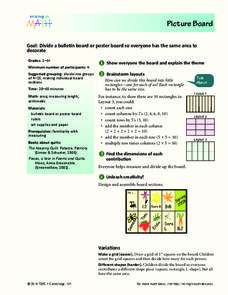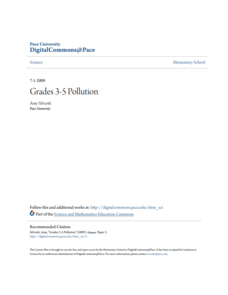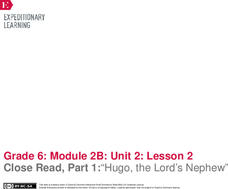Curated OER
Using Tens Frames for "Teen" Numbers
Sixth graders practice recognizing teen numbers for the part-whole strategy of bridging to ten. They approach the advanced counting stage to problem solve addition facts to ten utilizing dot patterns on a quinary frame with dot patterns...
Curated OER
Finding Total Given Part and Percentage
Students observe models of fractional parts. After writing the definitions of percent, part and whole, students use the calculators and computers to solve problems. Individually, they complete assigned problems where the convert the...
Curated OER
Real Life Math
Students have the opportunity to represent real-life situations mathematically in order to become familiar with part-to-whole relationships. In this real life math lesson, students study windowpanes and describe their shape and total...
Illustrative Mathematics
Make 9
Learning how numbers are put together as parts and wholes is a big step in building the foundational number sense of young mathematicians. Here, children are given a number less than 10 and are asked to find as many pairs of numbers as...
Curated OER
Picture Board
Learners divide a poster board so everyone gets the same amount of area to decorate. Youngsters talk about the different ways to divide a rectangle. They measure their lines to make sure that each piece is equal and then decorate their...
EngageNY
Grade 5 Math Module 1, Topic F, Lesson 15
Remainders don't need to remain a mystery. The 16th of 18 parts in Grade 5 Math Module 1 continues the study of dividing decimals by a whole number. Scholars see how to rename the remainder to a smaller unit, such as when dividing 1.7 or...
Pace University
Pollution
Over the course of 10 days, scholars take a pre-assessment to place them in one of three leveled groups. Whole-class and in small groups, pupils take part in read-alouds, field trips, hands-on activities, and complete learning contracts...
EngageNY
Close Read, Part 1: “Hugo, the Lord’s Nephew”
Fourth time is a charm. Learners complete multiple reads of Hugo, the Lord’s Nephew. On the fourth read, they make notes about each page on sticky notes. They then complete a think-pair-share activity with a partner to determine the...
Smithsonian Institution
Trait Tracker
Help mice beat the odds with an exciting activity about traits. Biologists discover the role of diet and other factors on animal traits by participating in a simulation activity. Teams collect and evaluate data to understand how certain...
Curated OER
Mystery Stars: Estimating Whole Numbers Using Fractions Shown on Sectors of a Circle
In this set of fraction worksheets, students cut out 6 pages of circles that show fractions with stars covering different sections of circles. They show one section of the circle in order to estimate the whole number of stars by looking...
Curated OER
Rational and Irrational Numbers 1
You'll need scissors, glue sticks, and mini whiteboards for this activity on rational and irrational numbers. Learners work in groups to classify a variety of expressions as rational or irrational. They are also given a mock discussion...
Curated OER
Fraction Circles
Fourth graders receive a fraction circle and show how each different part makes a whole. Students compare the different fractions that make up a whole. Students choose 2 fractions which are inside a bucket and they compare them both...
Curated OER
Percent Box
Students examine the procedures to determine a number when the percentage of the whole is known or to find the whole number when the part or percentage is known.
Curated OER
To Be (Half) Or Not To Be (Half)
First graders demonstrate various ways to represent and verify a whole or set separated in two, three, or four equal parts. Using interlocking cubes, Students model a part of a whole or a part of a set. They use appropriate tools and...
Curated OER
Technology Lesson Activity: Fractions
Fifth graders practice using the English measuring system by creating fractions. In this parts of a whole lesson, 5th graders combine math key bars to simulate small parts of a bigger item. Students combine the pieces to...
Curated OER
Divide and Conquer
Seventh graders analyze responses to different types of problems. Using pictures and diagrams, they explore and model the division of fractions. Students examine situations that call for division whether with the whole numbers or with...
Curated OER
Number and Number Relations: Lesson 2
Fourth graders participate in using the terminology of more, less, between, compare, and order. They compare whole numbers and use the symbols for <, >, =. They order whole numbers and practice with problems where they use this...
Curated OER
Number and Number Relations: Lesson 3
Eighth graders compare whole numbers and decimals. They use symbols for <, >, =, and order whole numbers and decimals. They practice the meaning of positive and nugative integers by using them to describe real-world situations.
Curated OER
Little Mouse, the Red Ripe Strawberry and Big Hungry Bear Lesson Plan
Students create a fruit salad using pieces of fruit cut in halves. In this early childhood lesson plan, students discover the concept of half and whole. Students experience this concept in a hands-on activity in which they cut fruit...
Curated OER
Finding PI
Students select and use appropriate operations, methods and tools to compute or estimate using whole numbers. They develop and use formulas for determining the circumference and area of circles. Students determine and describe the...
Illustrative Mathematics
Shape Hunt Part 1
The hunt is on! Send young mathematicians on a search for shapes in the first lesson of this two-part series. Each time a child finds a hidden shape, he draws it on his paper, and continues searching for the rest. Perform this activity...
Curated OER
Problem Solvers
Fifth and sixth graders compare decimals to the place-value structure in the base-ten number system. They represent fractions as parts of unit wholes, as parts of a set, as locations on a number line, and as divisions of whole numbers....
Curated OER
How Many?
Establish 1:1 correspondence by counting students, first one gender, then the other. Give each child a colored cube (one color for boys, another for girls) and have small groups determine more or less and how many all together. As a...
Pace University
Urban Communities
Urban communities are the focus of a series of lessons created to meet specific needs using differentiated instruction. A pre-assessment designates scholars into three groups based on their ability level. Small groups take part in...
Other popular searches
- Fractional Parts of a Whole
- Fractional Parts to Whole
- Parts and Wholes
- Parts to Wholes
- Fractions as Parts of a Whole
- Fractions Parts and Wholes
- Math Parts and Wholes
- Fractions Parts of Whole
- Fractions Parts of a Whole
- Fractional Parts of One Whole
- Whole and Parts
- Math Whole and Parts























